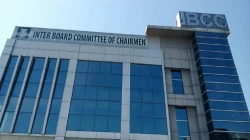The Pakistan Medical and Dental Council (PM&DC) has announced new regulations for students seeking admission to foreign medical and dental institutions. As the merit of government medical colleges in Pakistan continues to rise and the fees for private medical colleges become increasingly unaffordable, many students are opting to pursue MBBS degrees abroad.
While many international universities, including those in East Asia and China, offer MBBS degrees at lower tuition rates, the quality of education is often compromised. This has forced PMDC to introduce new regulations, as many students are returning with degrees from unrecognized institutions or with low-quality education.
According to the PMDC's latest guidelines, students planning to pursue their MBBS degrees abroad must fulfill certain formalities before leaving Pakistan. These changes, effective from the 2024-2025 academic session, aim to ensure the quality and legitimacy of foreign medical graduates entering Pakistan’s healthcare system.
Key Requirements for Studying MBB Abroad
PM&DC has outlined specific conditions that students must meet before enrolling in foreign medical colleges. These include:
- Academic Qualifications: Students must have passed FSC (Pre-Medical) or equivalent with a minimum of 60% marks.
- Standardized Testing: Students must qualify either SAT-II (minimum score of 550 per subject) or foreign MCAT/UCAT with 50% marks in Biology, Chemistry, and either Mathematics or Physics.
- MDCAT in Pakistan: The student must have obtained at least 50% marks in the Medical and Dental College Admission Test (MDCAT) conducted in Pakistan.
- Mandatory Registration with PM&DC: Students must register with PM&DC before enrolling in a foreign institution. Those already studying abroad before the 2024 session must also complete registration for compliance.
This move is aimed at regulating foreign medical education standards and ensuring that students who return to Pakistan meet the necessary competency levels.
What Happens After Completing a Foreign MBBS Degree?
After obtaining a foreign medical degree, graduates are required to appear in the National Registration Examination (NRE) and pass the exams to gain a practicing license in Pakistan. This exam assesses their medical knowledge and clinical skills, ensuring that they meet the country’s healthcare standards.
The NRE is a rigorous examination that challenges students across various medical disciplines. It consists of both written and clinical components, testing their ability to diagnose and treat patients effectively.
How Many Students Pass the PM&DC Exam After Studying Abroad?
Historically, the pass rate for students taking the PM&DC licensing exam after completing foreign medical degrees has been alarmingly low. Data suggests that only 15-25% of foreign medical graduates pass the NRE on their first attempt. This raises concerns about the quality of education provided by some international institutions and the preparedness of students returning to practice in Pakistan.
Among the students who fail, many come from institutions in China, Central Asian countries (Kyrgyzstan, Uzbekistan, Kazakhstan), and Eastern Europe. This is often due to:
- Language barriers in non-English speaking countries.
- Low-standard medical curricula in some institutions.
- Lack of clinical exposure and hands-on training.
- Insufficient preparation for PM&DC's stringent examination requirements.
Is Studying Medicine (MBBS) Abroad Worth It?
For students who do not secure admission to local medical colleges, studying abroad seems like an attractive option. However, given the low success rate in clearing the PM&DC licensing exam, students should thoroughly research their choices before enrolling in a foreign medical school. Here are some factors to consider:
Pros:
- Admission to foreign medical universities is often easier compared to Pakistan.
- Lower tuition fees in some countries.
- International exposure and experience.
Cons:
- The high failure rate in NRE exams.
- The additional financial burden for exam preparation and multiple attempts.
- Some foreign degrees are not recognized or lack accreditation by PM&DC.
- Language and cultural adaptation challenges.
How to Ensure Admissions to MBBS Degree Abroad
Students planning to study medicine abroad must take certain precautions to avoid future hurdles:
- Verify the University's Accreditation: Choose institutions recognized by PM&DC and WHO.
- Check Licensing Exam Pass Rates: Research the performance of previous graduates from your chosen university in the NRE.
- Prioritize English-Medium Programs: Ensure that the teaching language is English to avoid learning difficulties.
- Gain Clinical Experience: Look for universities that provide hands-on training in hospitals.
- Prepare for NRE from Day One: Keep up with PM&DC curriculum standards while studying abroad.
With these new regulations, PM&DC aims to maintain high medical education standards and ensure that foreign medical graduates are competent professionals. Students must make informed decisions before enrolling in a foreign medical school, considering the challenges of the NRE, the low pass rate, and future career prospects.
Before leaping to study abroad, prospective students should carefully evaluate their options, ensuring they choose institutions with high educational standards and strong licensing exam success rates. By taking the right steps, students can maximize their chances of a successful medical career in Pakistan.












